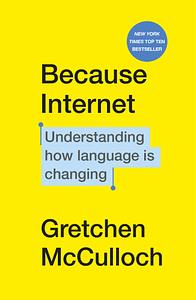You need to sign in or sign up before continuing.
Take a photo of a barcode or cover
Wrong time for me- nonfiction reading slump. Had to return to the library. Read about 30% and skipped around to things I was specifically interested in lol ^^
Grateful for this type of work...(triumphant)
Grateful for this type of work...(triumphant)
informative
reflective
medium-paced
funny
informative
lighthearted
I passed on this book when I first saw it but read it after a strong recommendation from Randall Munroe. I highly enjoyed reading it -- not only is it written in a fun, loose style, but it's interesting to introspect the new forms of internet writing that I understand intuitively but didn't know the history or theory behind.
This podcast was a pretty interesting taste: https://www.vox.com/podcasts/2019/11/25/20981722/gretchen-mcculloch-ezra-klein-emojis-internet-social-media-language
Three things I learned:
1. Three waves of internet users adopted it for very different reasons:
-The first wave (80s-early 90s) aimed to connect with strangers (on Usenet and other niche platforms)
-The second wave (late 00s-early 00s) aimed to connect with friends in a new outlet (on AIM, Myspace, maybe early FB)
-The third wave (more recent) came online by default because everyone else was there already, including authority figures
2. Historically (as shown in studies of letter-writing), women tend to be first in changing linguistic norms - this is still the case today (especially young women)
3. The term "meme" was first applied to internet culture by Mike Godwin to describe the spread of his famous Godwin's Law online
This podcast was a pretty interesting taste: https://www.vox.com/podcasts/2019/11/25/20981722/gretchen-mcculloch-ezra-klein-emojis-internet-social-media-language
Three things I learned:
1. Three waves of internet users adopted it for very different reasons:
-The first wave (80s-early 90s) aimed to connect with strangers (on Usenet and other niche platforms)
-The second wave (late 00s-early 00s) aimed to connect with friends in a new outlet (on AIM, Myspace, maybe early FB)
-The third wave (more recent) came online by default because everyone else was there already, including authority figures
2. Historically (as shown in studies of letter-writing), women tend to be first in changing linguistic norms - this is still the case today (especially young women)
3. The term "meme" was first applied to internet culture by Mike Godwin to describe the spread of his famous Godwin's Law online
Really good!! Easy to read, interesting, and never judgy. Borrowed this from a friend and might buy my own copy to use when teaching.
I liked this book overall, but I liked the more "structural" linguistic parts (the usage of emoji's, formatting, etc) vs. the historical linguistic parts.
Definitely taught me grace for internet users new-fangled punctuation/spelling/grammar,
or at least taught me more about why I text in complete sentences.
or at least taught me more about why I text in complete sentences.
This book! This was such a fun read into how the internet has shaped our language. The nuance of “lol” was sooooo intriguing to me, as was all the different ways we convey sarcasm & tone online. I also loved the description of social media as a hallway that you fill with people & sharing as a way to bump into / have more unplanned interactions with each other. (She puts this more eloquently idk).
informative
fast-paced
challenging
funny
informative
lighthearted
reflective
fast-paced






